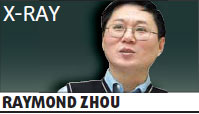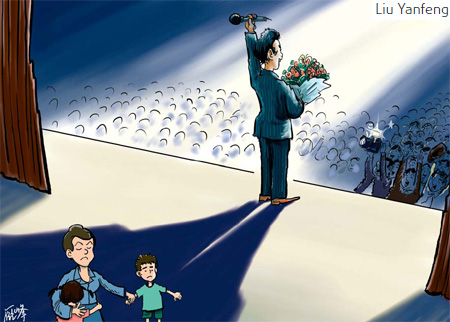 Andy Lau is facing the biggest dilemma of his career. He loves to keep up the facade of being a happy-go-lucky bachelor, yet custom mandates he perform certain tasks that contradict that appearance.
Andy Lau is facing the biggest dilemma of his career. He loves to keep up the facade of being a happy-go-lucky bachelor, yet custom mandates he perform certain tasks that contradict that appearance.
The Hong Kong superstar, in his blog, used the term "ancestor" to refer to the father of his long-rumored girlfriend Carol Chu. The older Chu died of a brain hemorrhage last Tuesday and Lau had to perform funeral rites, as befits a son-in-law, at the funeral. Though nobody could verify his attendance at the funeral procession because there was a sea of umbrellas - on a rainless day- Lau was presumably hidden behind one of them.
Monday was the seventh day after old Chu's death. It marked a milestone in the Chinese tradition of mourning. By now the Chinese-language media was playing a game called: "Can you spot Andy Lau?" The Malaysian media had a major coup: First Lau was seen leaving Chu's house with several of her family members; and then blurry photos surfaced of Lau burning incense and paying his respects at Chu's grave.
So, is Chu his girlfriend, fiance or wife?
Nobody seems to have a definite answer. By most accounts, Lau has been linked with the former Malaysian beauty queen for some 24 years. This is in an industry where most marriages do not last long. So, why didn't they tie the knot officially, or if they did, announce it?

You may say, nowadays there are people who like to live together without walking down the aisle, obtaining the proper documents and going the whole 9 yards. But Lau and a few other entertainment big shots are a different breed. Unlike Brangelina, they do not admit they are dating, let alone living together or secretly married. They never appear on the red carpet with their "lady friends". When pressed about marital status, they invariably give a set of equivocal answers.
Lau's stock answer is: "Fans are my family."
The Chinese phrase for this practice is "hiding a young beauty in a golden house". The surface reason goes like this: These big stars have a large following, many of whom harbor fantasies about them as their subconscious love interest. If the idols start dating, the fans will naturally lose hope and, worse yet, may do something crazy. In the early days of Jackie Chan's career, a female fan flew from Japan to Hong Kong to seek him out, and upon learning he was romantically attached, attempted to kill herself. This startled the kungfu comedian to such as extent that he has never acknowledged his marriage to Taiwan actress Joan Lin, except in his English-language biography.
Lau has had his share of crazy stalkers. The most famous, no doubt, was Yang Lijuan, whose desire to meet Lau in private led to one of the biggest - and saddest - melodramas in star-fan relationships, complete with her father's suicide and her story becoming a cautionary tale about everything that's wrong with relentless "star-chasing".
Celebrities of this stature tend to have stalkers. It almost comes with the job description. But do they need to pander to the irrational wishes and fantasies of this coterie? Lau and Chan have fan bases that are generally older than screaming teenagers. Most of them can accept their pin-ups have a normal life.
I'm not suggesting remaining single is not normal. I mean, the extreme separation of public persona and private life is bordering on the ridiculous. It's the other extreme with Hollywood stars, who play out their mating rituals in the full glare of the media headlights.
One has to go back to the days of Greta Garbo and Marlene Dietrich for examples of Hollywood stars who have so tightly guarded their private lives. But then, these screen goddesses had secret lives that did not conform to the social norms of the day. When the studio system was in vogue, a star rarely exposed his real image to the public, but rather used a manufactured one that was derived from and, in turn, enhanced the screen personality. Although Chinese stars like Lau and Chan do not have studio handlers hovering over them, they essentially operate with the studio-era mentality.
That does not mean they are, consciously or not, using bigger-than-life Hollywood forerunners as their role models. Apart from the practical considerations of keeping a cult-like fan base, Chinese superstars could be reaching back into our own traditions for inspiration. In the male-dominated age of our history, women were stored away in the inner sanctum of the family residence. The wife had the alias neiren, which literally means "person on the inside". A Chinese head of household might have a legion of wives and concubines, but they were crouching and hidden, not interacting with guests or out partying.
A Chinese man of social standing rarely took his spouse out on formal functions. Chinese classics portray male bonding with such poignancy that modern readers often squeeze homosexual overtones from it. In reality, these men all had wives, but they were left at home, and therefore out of sight of novelists. In the new movie Empire of Silver, bankers in the late 19th century were forbidden to take their family along on assignments that were as long as three years.
A lot of people feel it is unfair to Lin and Chu to live in the shadow of Jackie Chan and Andy Lau. To protect the required aura of someone forever pure and attractive, these women have to erase themselves from the public consciousness. Lin was a top-ranking star of the 1970s, and Chu a beauty queen. Shouldn't they share the limelight of their men? Do they have to remain invisible so that others can keep alive their dreams of becoming concubines to the stars?
Today, many people sympathize with the spouses of media personalities. In the old days, with polygamy, things were more complicated. A man of importance had several options when it came to making a public appearance with a spouse: Should he take the first wife? It was the ethical thing to do, but she probably could not help him by projecting an air of youth and beauty. Taking the younger one, it would be unfair to his "first love". If he took the whole entourage, it would be interpreted as a lack of self-restraint.
In 1930, for his tour of the United States that turned out to be the pinnacle of his illustrious career, Peking Opera megastar Mei Lanfang hesitated between taking the woman he was legally married to (an over-the-hill singer from the same genre who quit her career for him) and his paramour of the day, a big star in her own right. In the end, he did not take either of the women - a typical move for Chinese men caught in this quandary.
Although Lau has a pristine reputation, with no rumors of philandering whatsoever, the tactic of hiding the woman who has possibly been with him two dozen years and borne him a daughter - or possibly two kids - is immersed in the cultural genes of our country. An emperor could put hundreds, even thousands of women, under one roof; a star can surely keep his wife and children from the prying eyes of the public. It's part of the package.
Lau has another issue to address. Chinese custom dictates that a couple in this situation should marry within 100 days of the father's death, or wait three years. Some see this as pressure, but I don't care what decision he makes. It is his life, and he can be an emperor within his realm. But maybe it's his intention to turn "guess my wedding date" into another leitmotif for the tabloids.
raymondzhou@chinadaily.com.cn
相关阅读:
